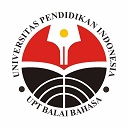The Perception of Japanese Language Education Students About Microteaching
Abstract
Keywords
Full Text:
PDF (IND)References
Anthonia, O.I. (2014). Microteaching: a technique for effective teaching. African Research Review. An International Multidisciplinary Journal, Ethiopia.8(4), 183-197.
Astika, G. (2014). Reflective teaching as alternative assessment in teacher education: a case study of pre-service teachers. TEFLIN Journal, 25(1).
Bell, N. D. (2007). Microteaching: what is it that is going on here? Linguistics and Education, 18(1), 24-40.
Bello, A.O., & Ayelaagbe, S.O. (2015). Microteaching: a strategy for training quality teachers in Nigerian Colleges of Education. Journal of Qualitative Education, 11(1), 1-8.
Creswell, J. W. (2009). Research Design: Qualitative, Quantitative, and Mixed Methods Approaches. Los Angeles: Sage.
Donnelly, R., & Fitzmaurice, M. (2011). Towards productive reflective practice in microteaching. Innovations in Education and Teaching International, 48(3), 335-346.
Fernandez, M. L. (2005). Learning through microteaching lesson study in teacher preparation. Action in Teacher Education, 26, 37-47. https://doi.org/10.1080/01626620.2005.10463341
Fernandez, M., & Robinson, M. (2006). Prospective teachers’ perspectives on microteaching lesson study. Education, 127(2), 203-215.
Ghafoor, A., Kiani, A., & Kayani, S. (2012). An exploratory study of microteaching as an effective technology. International Journal of Bussiness and Social Science, 3(4). Diakses dari www.ijbssnet.com.
Ghanaguru, S., Nair, P., & Yong, C. (2013). Teacher trainers’ beliefs in microteaching and lesson planning in a teacher training institution. The English Teacher, 42(2).
Ismail, S. A. A. (2011). Student teachers’ microteaching experiences in pre-service English Teacher Education Program. Journal of Language Teaching and Research, 2(5), 1043-1051. https://doi.org/10.4304/jltr.2.5.1043_1051
Kilic, A. (2010). Learner-centered microteaching in teacher education. International Journal of Instruction, 3(1). Diakses dari www.e.iji.net.
Kpanja, E. (2001). A study of the effects of video tape recording in microteaching training. British Journal of Educational Technology, 32(4), 483-486. http://dx.doi.org/10.1016/j.sbspro.2012.05.288
Kumar, S. (2016). Microteaching “an efficient technique for learning effective teaching” International Journal of Research in IT and Management (IJRIM), 6(8), 51-61.
Ping, W. (2013). Microteaching: a powerful tool to embedding the English teacher certification testing in the development of English teaching methodologies. International Journal of English Language and Literature Studies, 2(3), 163-175. Retrieved from http://www.aessweb.com/journal-detail.php?id=5019.
Pitoy, S. P. (2012). Information and language for communicative communication. TEFLIN Journal, 23(1). http://dx.doi.org/10.15639/teflinjournal.v23i1/91-114
Padmadewi, N. N., Artini, L. P., & Agustini, D. A. E. (2017). Pengantar Microteaching. Depok: Raja Grapindo Persada.
Padmadewi, N.M., & Mardani, D. S. M. (2017). Penyesuaian model pembelajaran mata kuliah microteaching berbasis standar proses kurikulum 2013 untuk lptk penyelenggara pendidikan bahasa Jepang di bali (Laporan Hasil Penelitian tidak dipublikasikan).
Partnership for advance Clinical Education (PACE). Microteaching. Diakses dari: Microteaching-(PACE).pdfchs.uonbi.ac.ke/sites/default/files/chs/chs/Microteaching-(PACE).pdf.
Peraturan Menteri Pendidikan Dan Kebudayaan Republik Indonesia Nomor 81a Tahun 2013 tentang Implementasi Kurikulum.
Peraturan Menteri Pendidikan Dan Kebudayaan Republik Indonesia Nomor 160 Tahun 2014 tentang Pemberlakuan Kurikulum 2006 dan Kurikulum 2013.
Peraturan Menteri Pendidikan Dan Kebudayaan Republik Indonesia Nomor 103 Tahun 2014 tentang Pembelajaran pada Pendidikan Dasar dan Pendidikan Menengah.
Peraturan Menteri Pendidikan Dan Kebudayaan Republik Indonesia Nomor 104 Tahun 2014 tentang Penilaian Hasil Belajar oleh Pendidik pada Pendidikan Dasar dan Pendidikan Menengah.
Peraturan Menteri Pendidikan Dan Kebudayaan Republik Indonesia Nomor No 70 / Tahun 2013 Kerangka Dasar dan Struktur Kurikulum Sekolah Menengah Kejuruan/ Madrasah Aliyah Kejuruan.
Remesh, A. (2013). Microteaching an effective teachnique for learning effective teaching. Journal of Research in Medical Science, 18(2), 158-163. Diakses dari www.ncbi.nlm.nih.gov.
Saban, A., & Çoklar, A. N. (2013). Pre-service teachers’ opinions about the microteaching method in teaching practice classes. TOJET. The Turkish Online Journal of Educational Technology, 12(2), 234-240. Diakses dari http://files.eric.ed.gov/fulltext/EJ1015454.pdf.
Shah, S. M. H., & Masrur, R. (2011). Impact of microteaching skills on the performance of primary school teachers. Gomal University Journal of Research, 27(1), 15-29. Diakses dari http://www.gomal.pk/GUJR/PDF/PDF-June-2011/3%20Manzoor%2015-29%20Paper.pdf.
Tiknaz, Y., & Sutton, A. (2006). Exploring the role of assessment tasks to promote formative assessment in Key Stage 3 Geography: evidence from twelve teachers. Assessment in Education 13(3), 327–343. https://doi.org/10.1080/09695940601035502
Trilling, B., & Fadel, C. (2009). 21st Century Skills: Learning for Life in our Time. San Francisco: Jossey-Bass.
Centre for Teaching and Learning Harvard University. (1999). What is Microteaching? Diakses dari isite.harvard.edu/fs/html/icb.topic58474/microteaching.html.
Teaching Support Services. Diakses dari www.tss.uoguelph.ca.
DOI: https://doi.org/10.17509/japanedu.v5i2.27493
Refbacks
- There are currently no refbacks.
Copyright (c) 2020 JAPANEDU: Jurnal Pendidikan dan Pengajaran Bahasa Jepang

This work is licensed under a Creative Commons Attribution-ShareAlike 4.0 International License.
 Published by:
Published by: Department of Japanese Language Education, Faculty of Language and Literature Education
Universitas Pendidikan Indonesia
 Online ISSN: Online ISSN:2528-5548 |

JAPANEDU: Jurnal Pendidikan dan Pengajaran Bahasa Jepang (e-ISSN:2528-5548) lisenced under a Creative Commons Attribution-ShareAlike 4.0 Internasional (CC BY-SA 4.0)


